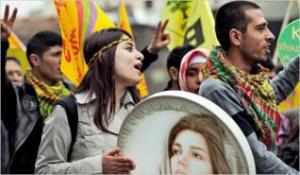
Western Experts: Kurds Make Gains in Turkish Elections

Western experts believe Kurds are the real winners of last week’s Turkish election but are skeptical that the new parliament will significantly change the political system.
Independent Kurdish candidates won 36 seats in the June 12 parliamentary election, up from 22 seats in the last parliament. Prime Minister Receb Tayyib Erdogan’s Justice and Development Party (AKP) won the most votes, 50 percent, which will give the party about 326 seats.
“For the most part, I think the results will mean that the government will continue largely as it has been. The victory will likely make the AKP safe from interference by the military,” said Paul Kubicek, a professor in the Department of Political Science at Oakland University and an expert on Turkish internal policy.
Experts believe that Kurds have for first time become an important element in Turkey’s political arena.
One of the key issues in the election was amending the constitution. Earlier this week Erdogan said the AKP and other parties "civilian, free constitution which embraces all parties of the society together.”
But AKP will need the support of other MPs to amend the constitution, and Kurds can play an important role.
“AKP does not have enough seats in the assembly to unilaterally change the constitution. Erdogan has said he wants to work with all parties,” Kubicek said.
During his campaign, Erdogan took a more nationalist tone and accused the main pro-Kurdish Peace and Democracy Party (BDP) of having links to Kurdistan Workers’ Party (PKK). He has also said that his party will not recognize any languages other than Turkish as official state languages.
Asked if this election brings changes in Turkish domestic politics, Kubicek told Rudaw “If the EU continues to put some pressure on the Turkish government and the Kurdish deputies resist doing anything too provocative, some progress will be made, but I do not see a major overhaul of the political system to decentralize it or make it a federal state.”
Parliamentary candidates can only be elected if their parties or coalitions win at least 10 percent of the vote. Kubicek expected Turkey’s election threshold may change.
“One reform that seems likely to take place is lowering the country’s election threshold from 10 percent to something close to 5 percent which could help the Kurds greatly,” he said.
Observers believe the new election law could reward Kurds with around 70 parliamentary seats.
BDP leaders let their candidates run independently rather than within the party to circumvent the threshold.
“Although a lot of attention has focused on Erdogan’s success, I would argue that the Kurdish BDP was the real big winner from these elections,” said Gareth Jenkins, an independent Istanbul-based British analyst.
“Its candidates increased their votes by a large margin. At the same time, they have raised the bar in terms of their demands, from greater cultural and political rights for Turkey’s Kurds to political autonomy. Importantly, the younger generation of Kurds wants even more. Many support full independence.”
PNA
- Add new comment
- 4066 reads


